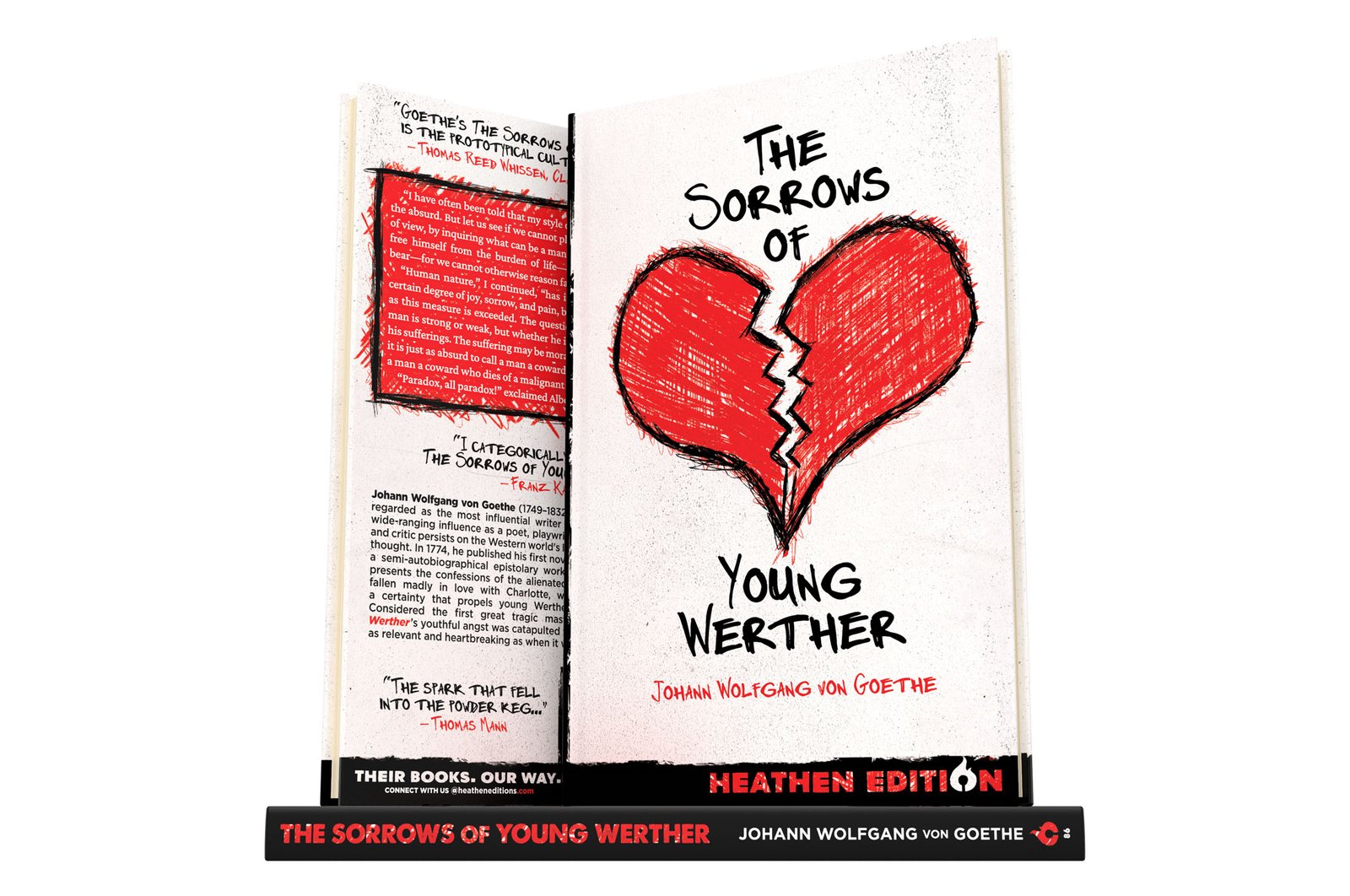No products in the cart.

The Sorrows of Young Werther
Spine #86
Author
Johann Wolfgang von Goethe
Translator
R. Dillon Boylan
First Edition
September 29, 1774
Heathen Edition
July 9, 2025
Refreshed
Pages
154
Heathen Genera
Existentialicious
Paperback ISBN
978-1-948316-86-6
Hardcover ISBN
978-1-963228-86-1
“I have often been told that my style of illustration borders a little on the absurd. But let us see if we cannot place the matter in another point of view, by inquiring what can be a man’s state of mind who resolves to free himself from the burden of life—a burden often so pleasant to bear—for we cannot otherwise reason fairly upon the subject.
“Human nature,” I continued, “has its limits. It is able to endure a certain degree of joy, sorrow, and pain, but becomes annihilated as soon as this measure is exceeded. The question, therefore, is, not whether a man is strong or weak, but whether he is able to endure the measure of his sufferings. The suffering may be moral or physical; and in my opinion it is just as absurd to call a man a coward who destroys himself, as to call a man a coward who dies of a malignant fever.”
“Paradox, all paradox!” exclaimed Albert.
Johann Wolfgang von Goethe (1749–1832) was a German polymath widely regarded as the most influential writer in the German language, whose wide-ranging influence as a poet, playwright, novelist, scientist, statesman, and critic persists on the Western world’s literary, political, and philosophical thought. In 1774, he published his first novel The Sorrows of Young Werther, a semi-autobiographical epistolary work — emphasis on pistol — that presents the confessions of the alienated and romantic Werther, who has fallen madly in love with Charlotte, who is to be married to Albert: a certainty that propels young Werther to an irrevocable conclusion. Considered the first great tragic masterpiece of European literature, Werther‘s youthful angst was catapulted to immediate success and lives on as relevant and heartbreaking as when it was first written.
Test Your Might
Paperback
OTHER RETAILERS
Rate & Shelve It
Hardcover
OTHER RETAILERS
Rate & Shelve It
“Johann Wolfgang von Goethe’s The Sorrows of Young Werther is the prototypical cult novel of all time.”
Thomas Reed Whissen
Classic Cult Fiction
Heathenry
Contents
Praise
Details
Heathenry
Goethe’s original was published in German in 1774, but, here, we’re utilizing R. Dillon Boylan’s 1854 English translation.
Boylan was British, but we’re Heathens, so we’ve jettisoned Boylan’s British spellings in favor of their American counterparts, and we’ve modernized several hyphened words so they’re easier on your eyes: to-day is now today, to-morrow has become tomorrow, and so on.
Additionally, any time a new/different character speaks, we begin their dialogue on a new line, whereas the original text sometimes had several characters all speaking within the same paragraph—an artifact of a bygone literary era that never fails to drive us absolutely bananas as we inevitably lose track of who said what to who.
We’ve also appended 170 footnotes to enhance your reading with definitions and parallels of many archaic and literary terms Goethe/Boylan utilized throughout the story, as well as to provide clarity, context, and commentary where necessary.
The original text also contained three footnotes, which we have retained and set apart using asterisks.*
Contents
Heathenry: Thoughts on the Text
The Sorrows of Young Werther
The Sorrows of Young Werther
Praise
“Johann Wolfgang von Goethe’s The Sorrows of Young Werther is the prototypical cult novel of all time.” —Thomas Reed Whissen, Classic Cult Fiction
“The world at once took possession of The Sorrows of Young Werther and it took possession of the world . . . [it was] the spark that fell into the powder keg causing the sudden expansion of forces that had been waiting release.” —Thomas Mann
“The novel’s romantic sensibilities struck a chord among the youth of Europe, who admired it with a cult-like fervor.” —Nicholas J. Karolides, 100 Banned Books
“I categorically say: read The Sorrows of Young Werther!” —Franz Kafka
“Throughout Europe, so many young men shot themselves while dressed as Werther and seated at their writing desks with an open copy of The Sorrows of Young Werther in front of them that the book was banned in Italy, Germany, and Denmark.” —Loren Coleman, The Copycat Effect
“Werther appeared to seize the hearts of men in all quarters of the world, and to utter for them the word which they had long been waiting to hear.” —Thomas Carlyle
“Dealing with depression because of his unrequited love, Goethe wrote the epistolary novel The Sorrows of Young Werther, an inspiration for many Romantics. It proved cathartic for him, but started a cult of morbidity and a series of suicides among impressionable young men, who felt they suffered as had Werther.” —Joanne Schneider, The Age of Romanticism
“Significantly thus, in Mary Shelley’s work, The Sorrows of Young Werther turns out to be one of the few books on the syllabus for Frankenstein’s monster to read in his hovel, so as to become precisely human.” —Barbara Johnson, A Life with Mary Shelley
Details
The Sorrows of Young Werther
Heathen Edition #86Published: July 9, 2025
Format: Paperback
Interior: Black & White on Cream Paper
Pages: 154 (+2 POD)
Language: English
Annotations: 170 Footnotes
Illustrations: 4
@heatheneditions #heathenedition
Copyright © 2025 Heathen Creative, LLC. All rights reserved.

